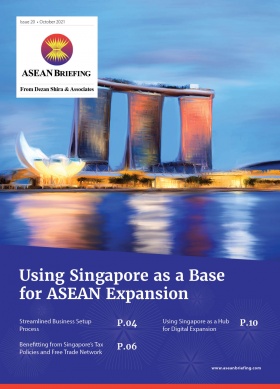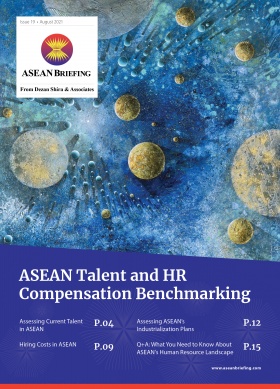Singapore Businesses Receive Boost as Border Restrictions to Ease
Singapore will ease cross-border travel restrictions from April 1, 2022, and allow the entry of vaccinated travelers without the need for quarantine. This is an important step to Singapore reclaiming its status as a business hub in Asia.
Singapore will significantly ease cross-border travel restrictions from April 1, 2022, and allow vaccinated travelers to enter the country without requiring quarantining. This also means the country’s current vaccinated travel lane (VTL) schemes will be scrapped.
Under the previous VTL scheme, only travelers who stayed at least seven days in a VTL-designated country were allowed entry into Singapore. They were exempted from quarantine but had to be fully vaccinated and take an antigen rapid test within 24 hours of arrival. There was also a quota on the number of daily arrivals.
This new travel lane scheme named the Vaccinated Travel Framework (VTF), will give a much-needed boost to businesses, especially the tourism industry, and revitalize Singapore’s reputation as a business and aviation hub.The move comes as ASEAN’s biggest economies, such as Indonesia, Thailand, Malaysia, and Vietnam, begin easing their border restrictions.
What are the requirements to enter Singapore under the Vaccinated Travel Framework?
Foreign travelers must have a visa to enter Singapore (where eligible) in addition to being fully vaccinated.
Full vaccination requirements
Travelers entering Singapore are considered to be fully vaccinated if they meet the following conditions two weeks before their arrival in the country:
- Received full regimen of one of the WHO Emergency Use Listing Procedure (EUL) vaccines and has met the minimum dose interval period; or
- Has contracted COVID-19 before being vaccinated with proof. The traveler must have received at least one dose of a WHO EUL vaccine at least 28 days before contracting COVID-19.
|
Vaccination Requirements for Entry to Singapore |
|||
|
Manufacturer |
Vaccine |
Dose(s) required |
Minimal interval between doses |
|
Pfizer/BioNTech |
BNT162b2/COMIRNATY Tozinameran (INN) |
2 |
17 days |
|
Moderna |
mRNA-1273 / Spikevax |
2 |
24 days |
|
AstraZeneca |
AZD1222-Vaxzeveria (ChAdOx1_nCoV-19) |
2 |
24 days |
|
Serum Institute of India |
Covishield (ChAdOx1_nCoV-19) |
2 |
|
|
Janssen |
Covishield (ChAdOx1_nCoV-19) |
1 |
N/A |
|
Sinopharm |
SARS-COV-2 Vaccine (VeroCell), Inactivated (InCoV) |
2 |
17 days |
|
Sinovac |
COVID-19 Vaccine (Vero Cell), Inactivated/CoronavacTM |
2 |
13 days |
|
Covaxin |
Bharat Biotech BBV152 COVAXIN® |
2 |
24 days |
|
Novavax |
NVX-CoV2373/Covovax/Nuvaxovid |
2 |
17 days |
|
Any of the above WHO EUL vaccines (mixed): |
2 |
||
Source: safetravel.ica.gov.sg
COVID-19 test
After April 26, 2022, fully vaccinated travelers will not be required to take a pre-departure COVID-19 test before entering Singapore.
COVID-19 insurance
Long-term pass holders and short-term visitors must obtain travel insurance with a minimum coverage of S$30,000 (US$22,095) against any COVID-19 related medical expenses. The traveler can be insured by either a Singapore or overseas-based insurer. The list of the available insurers in Singapore can be found here.
Submission of the healthcare declaration form
Up to 72 hours before arriving in Singapore, the traveler should submit an online healthcare declaration form through the SG Arrival Card (SGAC). The SGAC is where the traveler can upload their digitally verifiable vaccination certificate (if they have one).
Installation of the TraceTogether app
Travelers must install the TraceTogether contact tracing app on their phones.
Impact of COVID-19 weighs on Singapore’s economy
As Singapore gradually opened its borders, its economy grew by 7.2 percent in 2021, a major bounce considering a record 5.4 percent contraction in 2020. The government aims for the country’s GDP to grow between three and five percent in 2022 although this growth is expected to be uneven, especially for the aviation and tourism industry.
Singapore as a base for ASEAN expansion
The reopening of Singapore’s borders is vital for reclaiming its status as a business hub in the Asia Pacific. The city-state is already home to 37,000 international companies and 7,000 multinational companies who use Singapore as a base for their Asia operations.
Such companies are attracted by the country’s stable socio-political environment, free-market economy, highly efficient infrastructure, and attractive tax regime.
Foreign investors can incorporate a company with a paid-up minimum capital of just S$1 (US$0.73), as well as be eligible for a variety of fiscal and non-fiscal incentives that are among the most competitive in the world. For instance, Singapore’s corporate tax rate of 17 percent is effective only for chargeable income above S$200,000 (US$147,000) with a 50 percent exemption on the next S$190,000 (US$139,000) of chargeable income. Moreover, there is no capital gains tax.
Further Reading
- Why Use Singapore as a Base for ASEAN Expansion
- New Tax Measures Impacting Businesses and Individuals in Singapore’s Budget 2022
- Incentives and Support for Businesses in Singapore’s Budget 2022
About Us
ASEAN Briefing is produced by Dezan Shira & Associates. The firm assists foreign investors throughout Asia and maintains offices throughout ASEAN, including in Singapore, Hanoi, Ho Chi Minh City, and Da Nang in Vietnam, Munich, and Esen in Germany, Boston, and Salt Lake City in the United States, Milan, Conegliano, and Udine in Italy, in addition to Jakarta, and Batam in Indonesia. We also have partner firms in Malaysia, Bangladesh, the Philippines, and Thailand as well as our practices in China and India. Please contact us at asia@dezshira.com or visit our website at www.dezshira.com.







